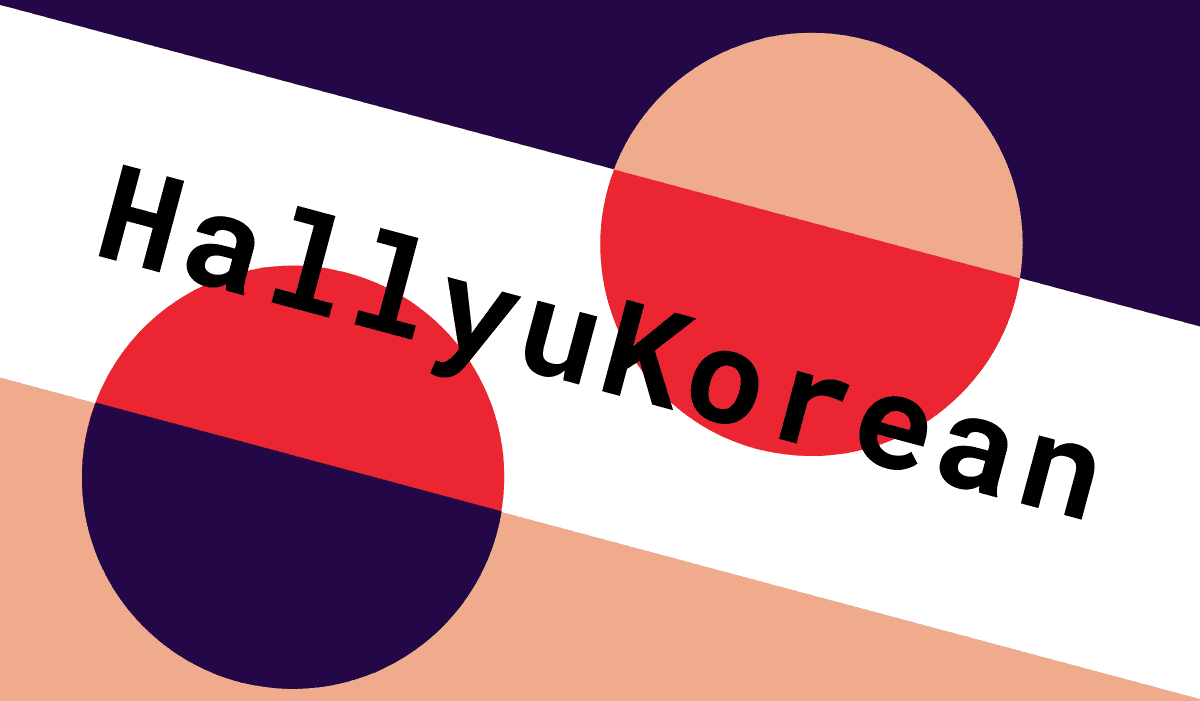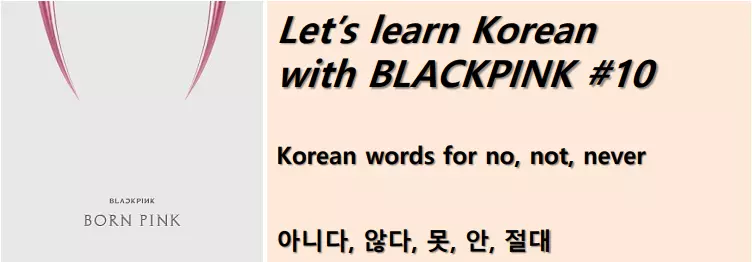Korean words for no, not, never : 아니다, 않다, 못, 안, 절대
Let’s learn Korean words for no, not, never with BLACKPINK lyrics.
Click the play button below to listen to all the BLACKPINK lyrics used in this post.
Negative Expressions in Korean
*안 + verb : don’t
*못 + verb : can’t
*Verb[adjective] stem + 지 않다 : don’t, can’t
*Verb[adjective] stem + 지 못하다 : can’t
*Verb[adjective] stem + 지만 : but, however, although
*Verb[adjective] stem + 지 말고 : don’t ~ and
아니다 [a-ni-da] no, not, to not be
그게 당연한 거야. 욕심이 아니잖아
geu-ge dang-yeo-nan geo-ya. yok-si-mi a-ni-ja-na
That’s a given. It’s not so greedy
*그게(그(that) + 것(thing) + 이(subject particle), =그게) +
당연한(당연하다(be natural) + ㄴ(noun modifier)) +
거야.(것(thing) + 이다(be), =거야.) +
욕심(greed) + 이(subject particle) +
아니잖아(아니다(no) + 잖아(as you know))
(*~잖아(요) reminds the listener of something or rebukes the listener indirectly.
~잖아(요) is the same as ‘as you know’, ‘didn’t I say that~’ in English.)
않다 [an-ta] to not do, to not be
반쪽을 원친 않아
ban-jjo-geul won-chin a-na
I don’t want half
*반쪽(half) + 을(object particle) +
원치 않아. (원하다(want) + ~지 않다(don’t), =원치 않아)
(*This sentence has no subject.
It’s important to note that while English sentences require a subject, Korean sentences often omit the subject.
The omitted subject can be identified in the context of the dialogue or writing.)
못 [mot] cannot, not able to
여전히 이곳에서 널 잊지 못해
yeo-jeo-ni i-go-se-seo neol it-ji mot-hae
Still in this place, I can’t forget you
*여전히(still) +
이(this) + 곳(place) + 에서(in) +
널(너(you) + 를(object particle), =널)
잊지 못해(잊다(forget) + 지 못하다(can’t), =잊지 못해)
(*곳 is a dependent noun to mean place, it can be combined with 이(this), 그(that), 저(that over there) like 이곳(this place), 그곳(that place), 저곳(that place over there).)
안 [an] not, never, no
말도 안 돼. 난 너에게 끌려 버렸어
mal-do an dwae. nan neo-e-ge kkeul-lyeo beo-ryeo-sseo
It’s ridiculous. I’m attracted to you
*말(word) + 도(too) +
안(not) + 돼(be) +
난(나(I) + 는(topic particle), =난) +
너(you) + 에게(to)
끌려 버렸어(be drawn to)
(*말도 안 되다 [말도 안 돼] actually means that something is so unbelievable that there is no point in talking about it.)
절대 [jeol-dae] never
절대 많은 걸 원치 않아. 맘을 원해 난
jeol-dae ma-neun geol won-chi a-na. ma-meul won-hae nan
I never want a lot of things, just your heart
[I don’t ask for much, just your heart]
*절대(never) +
많은(많다(be a lot) + 은(noun modifier)) +
걸(것(thing) + 을(object particle), =걸) +
원치 않아. (원하다(want) + ~지 않다(don’t), =원치 않아)
맘(heart, =마음) + 을(object particle) +
원해(want) +
난(나(I) + 는(topic particle), =난)
(*Word order is important for understanding English sentences, while particles (e.g. 은/는/이/가/을/를) are important for understanding Korean sentences.
It is important to note that in Korean the verb is at the end of the sentence, which is different from the order in English.
The following is more common, but because it’s lyrics, the subject may be backwards.
난(subject) 맘을(object) 원해(verb)
맘 is a shortened form of 마음, and 맘 is also commonly used in everyday conversation.)
Grammar Reference
*Noun + ~에서 : at[from, in, out of]
ex) 이곳에서 : 이(this) + 곳(place) + 에서(in)
*Noun + ~에게 : to
ex)너에게 : 너(you) + 에게(to), =네게
*Tense
*Present tense : Adjective/verb stem + ~아/어/해요
*Past tense : Adjective/verb stem + ~았/었/했어요
*Future tense : Adjective/verb stem + ~(으)ㄹ 거예요 / ~ㄹ 게요/ ~겠어요
The basic way to get the verb/adjective stem is to remove 다 from the verb/adjective.
If there is a vowel ㅏ or ㅗ on the final syllable of the adjective/verb stem, 아요(present tense), 았어요(past tense), 을 거예요(future tense) is used.
If there is a vowel other than ㅏ or ㅗ on the final syllable of the adjective/verb, 어요(present tense), 었어요(past tense), ㄹ 거예요(future tense) is used.
Also, if there is 하다 in the adjective/verb, 하다 changes to 해요(present tense), 했어요(past tense), 할 거예요(future tense).
Below you can see the conjugation of 아니다, 않다 by tenses.
| Present tense | Past tense | Future tense | |
| 아니다 | 아니에요 | 아니었어요 | 아닐 거예요 |
| 않다 | 않아요 | 않았어요 | 않을 거예요 |
*Speech levels
The three most commonly used Korean speech levels are 합쇼체 (formal polite), 해요체 (informal polite) and 해체 (informal plain).
*The formal polite style : Adjective/verb stem + ~(스)ㅂ니다
~(스)ㅂ니다 is used more in formal or public situations including the military, news, reporting presentations, meetings and lectures. It’s mainly used to address large gatherings or people you don’t know personally.
*The informal polite style : Adjective/verb stem + ~아/어/해요
~아/어/해요 is most commonly used in everyday life. Compared to the formal polite style, the informal polite style is softer and less formal, so it is mainly used among family members, friends, shopkeepers and other close acquaintances.
*The informal plain style : Adjective/verb stem + ~아/어/해
As for the informal plain style ~아/어/해, it is mainly used among friends from superiors to people of lower rank and among family members.
Below you can see the conjugation of 아니다, 않다 by speech levels.
| Formal polite | Informal polite | Informal plain | |
| 아니다 | 아닙니다 | 아니에요 | 아니야(=아냐) |
| 않다 | 않습니다 | 않아요 | 않아 |

